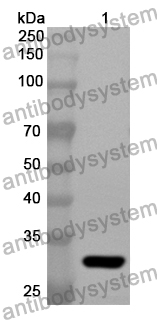Catalog No.
PHG05401
Species reactivity
Human, Mouse, Rat
Host species
Rabbit
Isotype
IgG
Clonality
Polyclonal
Immunogen
E. coli - derived recombinant Human EEF1A2 (Gly213-Lys463).
Tested applications
ELISA: 1:4000-1:8000, IHC: 1:50-1:100, WB: 1:1000-1:4000
Target
Elongation factor 1-alpha 2, EEF1AL, Eukaryotic elongation factor 1 A-2, eEF1A-2, EF-1-alpha-2, Statin-S1, STN, EEF1A2
Purification
Purified by antigen affinity column.
Accession
Q05639
Applications
ELISA, IHC, WB
Form
Liquid
Storage buffer
0.01M PBS, pH 7.4, 50% Glycerol, 0.05% Proclin 300.
Stability and Storage
Use a manual defrost freezer and avoid repeated freeze thaw cycles. Store at 2 to 8°C for frequent use. Store at -20 to -80°C for twelve months from the date of receipt.
Endogenous epitope tagging of eEF1A2 in mice reveals early embryonic expression of eEF1A2 and subcellular compartmentalisation of neuronal eEF1A1 and eEF1A2., PMID:37429391
Analysis of the Expression and Subcellular Distribution of eEF1A1 and eEF1A2 mRNAs during Neurodevelopment., PMID:35741005
Targeted Therapies for Multiple Myeloma., PMID:33922567
Tumor suppressor DRD2 facilitates M1 macrophages and restricts NF-κB signaling to trigger pyroptosis in breast cancer., PMID:33859743
Identification of loci associated with susceptibility to bovine paratuberculosis and with the dysregulation of the MECOM, eEF1A2, and U1 spliceosomal RNA expression., PMID:33432064
A rapid and specific method to simultaneously quantify eukaryotic elongation factor 1A1 and A2 protein levels in cancer cells., PMID:31450069
[Preparation of monospecific antibodies against isoform 2 of translation elongation factor 1A (eEF1A2)]., PMID:24749247
Dissecting the expression of EEF1A1/2 genes in human prostate cancer cells: the potential of EEF1A2 as a hallmark for prostate transformation and progression., PMID:22095224
eEF1A phosphorylation in the nucleus of insulin-stimulated C2C12 myoblasts: Ser⁵³ is a novel substrate for protein kinase C βI., PMID:20923971
Resveratrol suppresses growth of human ovarian cancer cells in culture and in a murine xenograft model: eukaryotic elongation factor 1A2 as a potential target., PMID:19738051
The prognostic significance of elongation factor eEF1A2 in ovarian cancer., PMID:18164751
Characterization of a putative ovarian oncogene, elongation factor 1alpha, isolated by panning a synthetic phage display single-chain variable fragment library with cultured human ovarian cancer cells., PMID:17908984
Translation elongation factor eEF1A2 is essential for post-weaning survival in mice., PMID:17640869
Expression of eEF1A2 is associated with clear cell histology in ovarian carcinomas: overexpression of the gene is not dependent on modifications at the EEF1A2 locus., PMID:17437010
Expression of protein elongation factor eEF1A2 predicts favorable outcome in breast cancer., PMID:16897428
Aromatase inhibitors increase the sensitivity of human tumor cells to monocyte-mediated, antibody-dependent cellular cytotoxicity., PMID:16164922
Translation elongation factor eEF1A2 is a potential oncoprotein that is overexpressed in two-thirds of breast tumours., PMID:16156888
Immuno-characterization of the switch of peptide elongation factors eEF1A-1/EF-1alpha and eEF1A-2/S1 in the central nervous system during mouse development., PMID:15013623
Changes in protein levels of elongation factors, eEF1A-1 and eEF1A-2/S1, in long-term denervated rat muscle., PMID:12808202
Generation and epitope mapping of high-affinity scFv to eukaryotic elongation factor 1A by dual application of phage display., PMID:11422370
Cell cycle distribution of cord blood-derived haematopoietic progenitor cells and their recruitment into the S-phase of the cell cycle., PMID:10759722
All-trans retinoic acid (ATRA)-induced apoptosis is preceded by G1 arrest in human MCF-7 breast cancer cells., PMID:9460987
The expression of proliferation and quiescence associated antigens in acute myeloid leukemia correlates with survival duration: analysis of 15 refractory cases., PMID:9234585
Immunohistochemical analysis of statin in colorectal adenocarcinoma, polyps, and normal mucosa., PMID:8620806
Predictive value of statin, a G0-associated cell cycle protein, in childhood acute lymphoblastic leukemia., PMID:7622304
Expression of proliferation-specific genes in the mucosa adjacent to colon carcinoma., PMID:7736875
Proliferative activity at colonic anastomoses as determined by statin. A nonproliferation-specific nuclear protein., PMID:8200231
Characterization of 57 kDa statin as a true marker for growth arrest in tissue by its disappearance from regenerating liver., PMID:8106565
Cell cycle kinetic effects of tamoxifen on human breast cancer cells. Flow cytometric analyses of DNA content, BrdU labeling, Ki-67, PCNA, and statin expression., PMID:7904138
The differential expression of statin in the nuclei of human colonic crypts adjacent to a cancer: an immunohistochemical study., PMID:7682866
Statin, a protein specifically present in nonproliferating cells, is a phosphoprotein and forms a complex with a 45-kilodalton serine/threonine kinase., PMID:1400486
Proliferative activity of colonic mucosa at different distances from primary adenocarcinoma as determined by the presence of statin: a nonproliferation-specific nuclear protein., PMID:1511650
Histochemical localization of Statin--a non-proliferation-specific nuclear protein--in nuclei of normal and abnormal human thyroid tissue., PMID:1380846
Statin immunolocalization in human brain tumors. Detection of noncycling cells using a novel marker of cell quiescence., PMID:1855178
Isolation and characterization of the rat chromosomal gene for a polypeptide (pS1) antigenically related to statin., PMID:1709933
Statin expression in the untreated and SarCNU-exposed human glioma cell line, SK-MG-1., PMID:2208582
Statin, a nonproliferation-specific protein, is associated with the nuclear envelope and is heterogeneously distributed in cells leaving quiescent state., PMID:2674158
The disappearance of a cyclin-like protein and the appearance of statin is correlated with the onset of differentiation during myogenesis in vitro., PMID:2892689
Contact-inhibition-induced quiescent state is marked by intense nuclear expression of statin., PMID:3312241
Rapid disappearance of statin, a nonproliferating and senescent cell-specific protein, upon reentering the process of cell cycling., PMID:3902853
A 57,000-mol-wt protein uniquely present in nonproliferating cells and senescent human fibroblasts., PMID:3968178

